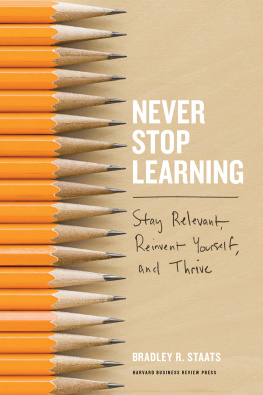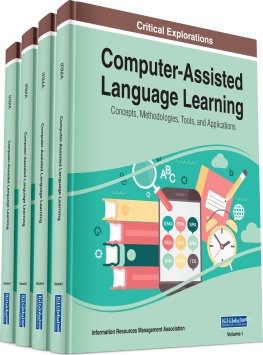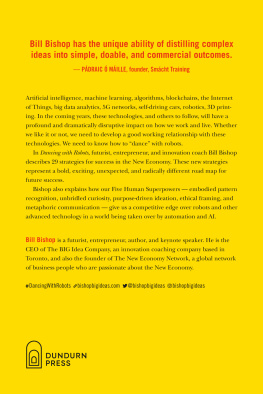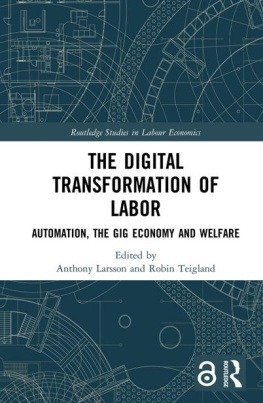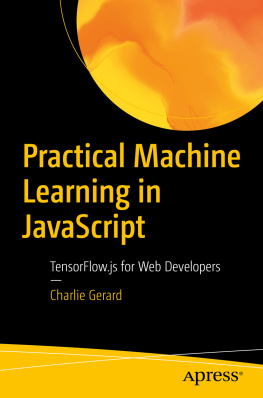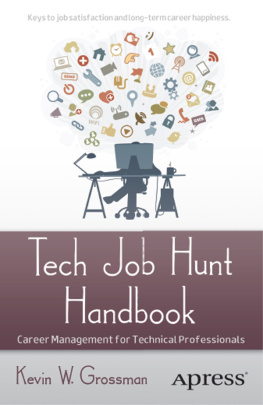Once upon a time, competitive advantage belonged to the people who knew the most. Now it accrues to those who know how to learn the most. In his new book, Brad Staats skillfully takes you through the latest evidence on how to accelerate your learning at work.
ADAM GRANT , New York Times bestselling author, Give and Take, Originals , and Option B (with Sheryl Sandberg)
A brilliant tutorial in how we learnor more oftenhow we dont. The essential guidebook to prepare for a new age.
GENERAL (RET) STANLEY MCCHRYSTAL , Commander, U.S. and International Security Assistance Forces in Afghanistan; bestselling author, Team of Teams
In this astute work, Brad Staats describes the forces that are propelling us into an economy that values the ability to learn above all else. Using a mix of behavioral science and operations research, he demystifies the learning process and explains how each of us can become a dynamic learner. This book is essential reading for anyone hoping to learn faster and better.
DANIEL H. PINK , author, When and Drive
Brad Staats provides a practical road map to one of the biggest challenges facing leaders today. Now more than ever, the best leaders know they need to be lifelong learners in order to stay ahead of the curve. Never Stop Learning is packed with powerful insights and tips to help you master the art of learning.
MATT BREITFELDER , Chief Talent Officer and Managing Director, BlackRock
If we are to succeed in this ever-changing environment, then learning and adapting is absolutely critical. In this book, Brad Staats unpacks the science of why we dont learn at work and compellingly shows us how we can do better. A vital guide for thriving in the twenty-first century.
FRANCESCA GINO , Professor of Business Administration, Harvard Business School; author, Rebel Talent and Sidetracked
With change accelerating, the ability to learn has become the quintessential business skill. Yet most people arent very good at it, and most company cultures subtly discourage it. Teaching people and companies to become fast, effective, and continuous learnerswhich Staats does compellingly in this new bookis a fundamental first step toward conquering the future.
ALAN MURRAY , Chief Content Officer, Time Inc.; President, Fortune
Never Stop Learning is the best book ever written about how you, your team, and your organization can keep learning to do better and more fulfilling work. The studies provide delightful twists, and the stories are instructive and inspiring. Staats weaves it all together to create a masterpiece that is so fun to read and so useful that you wont be able put it down. And, after youre done, you will never think about your work in quite the same way again.
ROBERT SUTTON , professor, Stanford; bestselling author, Good Boss, Bad Boss and Scaling Up Excellence
Copyright
HBR Press Quantity Sales Discounts
Harvard Business Review Press titles are available at significant quantity discounts when purchased in bulk for client gifts, sales promotions, and premiums. Special editions, including books with corporate logos, customized covers, and letters from the company or CEO printed in the front matter, as well as excerpts of existing books, can also be created in large quantities for special needs.
For details and discount information for both print and ebook formats, contact .
Copyright 2018 Bradley R. Staats
All rights reserved
No part of this publication may be reproduced, stored in or introduced into a retrieval system, or transmitted, in any form, or by any means (electronic, mechanical, photocopying, recording, or otherwise), without the prior permission of the publisher. Requests for permission should be directed to , or mailed to Permissions, Harvard Business School Publishing, 60 Harvard Way, Boston, Massachusetts 02163.
First eBook Edition: May 2018
ISBN: 9781633692855
eISBN: 9781633692862
For Tricia and Dave
with you I never stop learning

| Chapter 1 |
BECOMING A DYNAMIC LEARNER Whatever we achieve inwardly will change outer reality. Otto Rank |
My paternal grandfather, Preston William Staats Sr., grew up in New Braunfels, Texas, where his father owned the Candy Kitchen, a small store that sold sweets and soft drinks. Recognizing a growth opportunity when he saw one, my great-grandfather, Preston Seniors father, had secured Coca-Cola bottling rights for the region. Preston Senior worked at the plant as a child and then, when the time was right, headed forty-five miles up the road to Austin to attend the University of Texas. After college he returned to New Braunfels to run the Coke plant. My maternal grandfather, Brooks Woolford, grew up in Houston, where he worked as a credit manager for most of his adult life. My grandfathers lived outside their respective hometowns only while they served in World War II.
Contrast their experience with that of their two grandchildrenmy brother, Trent, and me. We grew up in Austin, and we both went to the University of Texas at Austin for our undergraduate degrees (Hook em, Horns!). Trent stayed on to get his PhD in engineering and then started a company that enabled real-time monitoring of power transmission lines for electricity traders. After he sold the company, he headed to Harvard Business School to get an MBA. He stayed in Boston for the next ten years, working at startups in biotechnology, biofuels, and chemical waste reclamation.
After I graduated from UT-Austin, I went to work in investment banking at Goldman Sachs, first in New York and then in Houston. I moved to Boston to get my own MBA at Harvard Business School (HBS), and then I worked at Dell Computer in Austin, doing strategic planning, and at a venture capital firm in Tampa that focused primarily on technology and health care services. I headed back to Boston to get a doctorate at HBS and moved to Chapel Hill as a professor at the University of North Carolinas Kenan-Flagler Business School, where Ive been ever since, with the exception of a year as a visiting professor at the University of Pennsylvanias Wharton School in Philadelphia.
The contrast between our grandfathers experience and Trents and mine is not atypical. Careers today usually involve multiple employers and often multiple industries. Data that tracks individuals over time is sparse, but a Bureau of Labor Statistics report that followed workers aged eighteen to forty-eight over the years 1978 to 2012 found that on average, workers held twelve different jobs.5.4 percent were holding the same job theyd held from age thirty to thirty-four. For most people, the only constant is change.
To succeed in this new environment requires continual learninghow to do existing tasks better and how to do entirely new things. If we fail to learn, we risk becoming irrelevant. We end up solving yesterdays problems too late instead of tackling tomorrows problems before someone else does.
But were bad at learning. Supremely bad. In fact, were our own worst enemies. Instead of doing the things that will help us learn, we often do just the opposite. We are unwilling to take risks that might lead to failure. We obsess about outcomes while neglecting to examine carefully the process through which we achieve them. We rush to answers instead of asking questions. We want to be seen doing somethinganythingso we dont step back to recharge and reflect. We follow the path that others have beaten rather than forge one of our own. We look to fix irrelevant weaknesses instead of playing to our strengths. We focus narrowly rather than draw on broad experience. We treat learning as an individual exercise and neglect the important role played by others.

